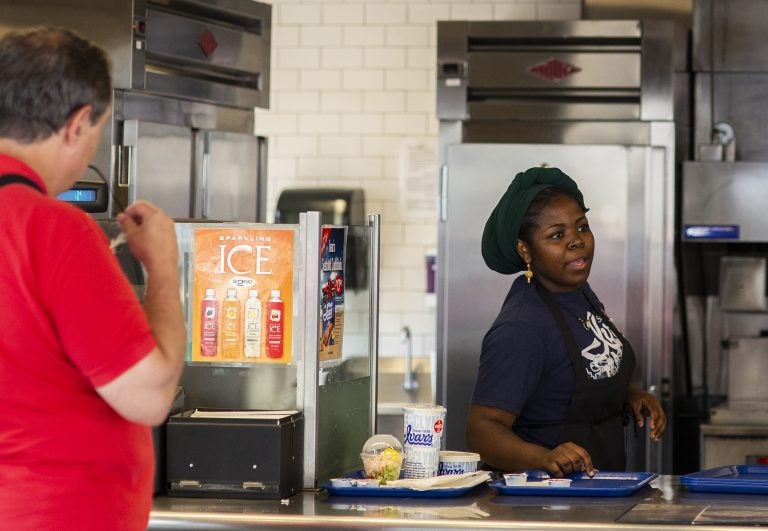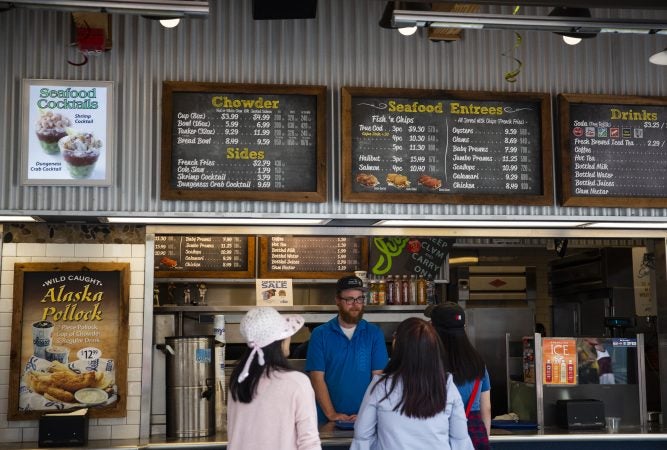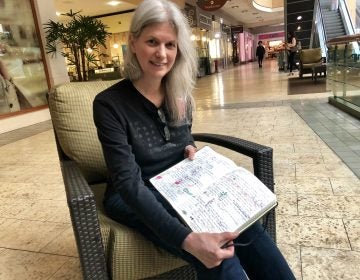As Philly considers copying Seattle law making hourly workers’ schedules easier, here’s how it’s working there
If passed in Philadelphia, backers say it would help 130,000 employees — most of them part-time chain retail and fast-food workers — or 20 percent of the city's workforce.
Listen 5:02
Hawa Hamadi serves up an order at Ivar's Fish Bar, the to-go section of Ivar's on the waterfront pier, on Wednesday, August 15, 2018 in Seattle, Washington. Ivar's is one of the local businesses affected by Seattle's Secure Scheduling Ordinance, which took effect in July 2017, aiming to establish more predictable work schedules for employees of large retail and food establishments. (Lindsey Wasson for the Inquirer)
In the coming weeks, Philadelphia City Council will begin debating a bill designed to deal with a common headache for an estimated 20 percent of the city’s labor force: their often unpredictable work schedules.
Councilwoman Helen Gym introduced the legislation in June. If passed, backers say 130,000 employees – most of them part-time chain retail and fast-food workers – would get their schedules two weeks in advance, be compensated for last-minute changes, and have a chance at full-time hours.
“Too many people are kept in poverty because of terrible practices like abusive scheduling that wreak havoc on people’s lives and leave them unable to predict their monthly incomes for rent or childcare,” said Gym.
Other big cities have similar “fair workweek” legislation, which gives Gym confidence Philadelphia can, too. It also means there’s a well of potentially valuable insight into what workers and their bosses might expect if it comes to pass here.
To see how this kind of law is working elsewhere, The Philadelphia Inquirer and Daily News along with WHYY traveled to Seattle, one of four major cities with a fair workweek measure.
In July 2017 – three years after becoming the first major city to pass a $15 an hour minimum wage – Seattle rolled out its “secure scheduling” ordinance.
The law applies to roughly 1,000 employers and an estimated 40,000 employees, including single moms, but also college students struggling to juggle class and work.
Levi Underwood, a shift supervisor at Starbucks, always got his schedule two weeks in advance, even before secure scheduling became law, but his manager often asked him to cover extra shifts on short notice.
One time, the communications major failed one of his classes because he had to fill in on a Saturday he’d set aside to finish a final paper.

“I got called and it was just like, ‘There’s no one else. You’re the only one that can come in,’” said Underwood, who was already scheduled to work that Sunday.
He ended up rushing the paper, which meant he didn’t get enough points to pass the course. Failing the class meant he had to take it again, delaying his timeline for finishing his degree.
Thanks to the new law, Underwood said he doesn’t feel obligated to pick up last-minute shifts.
Similar to the bill proposed in Philadelphia, Seattle’s law has protections against retaliation. Legally, workers can refuse unscheduled hours without worrying they’re risking their jobs.
There are also financial consequences if a manager changes the schedule after workers get their hours.
For example, if a manager takes someone off the schedule, that worker gets paid for half of the missed hours.
It’s called premium pay, and it’s a sticking point for some businesses affected by secure scheduling, but also some employees who say those bonus hours often take time to reach their paychecks.
Bob Donegan is president of Ivar’s, an iconic Seattle seafood chain that employs roughly 1,000 people. About one quarter of them are covered by secure scheduling.
Donegan said that’s hurt his bottom line.
During the first six months the law was in effect, Ivar’s paid almost $30,000 to employees because of schedule changes, some of which Donegan said couldn’t be avoided.
“We don’t get the time of kickoff for the University of Washington Huskies Football games on Saturday until Tuesday night, so every employee who works in the stadium gets a 50 percent pay premium,” said Donegan.
The company also laid out $7,000 for software to document scheduling changes at all of its quick-serve locations, including the Fish Bar on Pier 54, a popular tourist destination.
“That would be the profits that we earn in the Fish Bar in a busy summer month,” said Donegan.
It’s one of the reasons Ivar’s has raised menu prices, he said.

Seattle hired a team of researchers to evaluate the law over the next two years.
In the meantime, there is data about how many companies have broken the law – and paid for it – because of Seattle’s dedication to enforcement, a standout among cities with similar measures.
To date, investigators with Seattle’s Office of Labor Standards have closed five cases tied to secure scheduling, including one with The Gap for $20,186.24.
Policy manager Karina Bull said it’s goal to finish cases in six months is also among the fastest in the country.
It appears Philadelphia will be the next city with a fair workweek law.
Eight councilmembers, including Gym, co-sponsored the bill. If the measure passes out of committee, she would need just one more vote to send it to Mayor Jim Kenney’s desk for a signature.
“From working parents to conscientious employers to workforce development and labor advocates to public interest groups and religious leaders – people understand that stable schedules make sense for workers and for businesses,” said Gym.
 WHYY and Philadelphia Media Network are two of 21 news organizations producing Broke in Philly, a collaborative reporting project on solutions to poverty and the city’s push towards economic justice. See all of our reporting at brokeinphilly.org.
WHYY and Philadelphia Media Network are two of 21 news organizations producing Broke in Philly, a collaborative reporting project on solutions to poverty and the city’s push towards economic justice. See all of our reporting at brokeinphilly.org.
WHYY is your source for fact-based, in-depth journalism and information. As a nonprofit organization, we rely on financial support from readers like you. Please give today.









